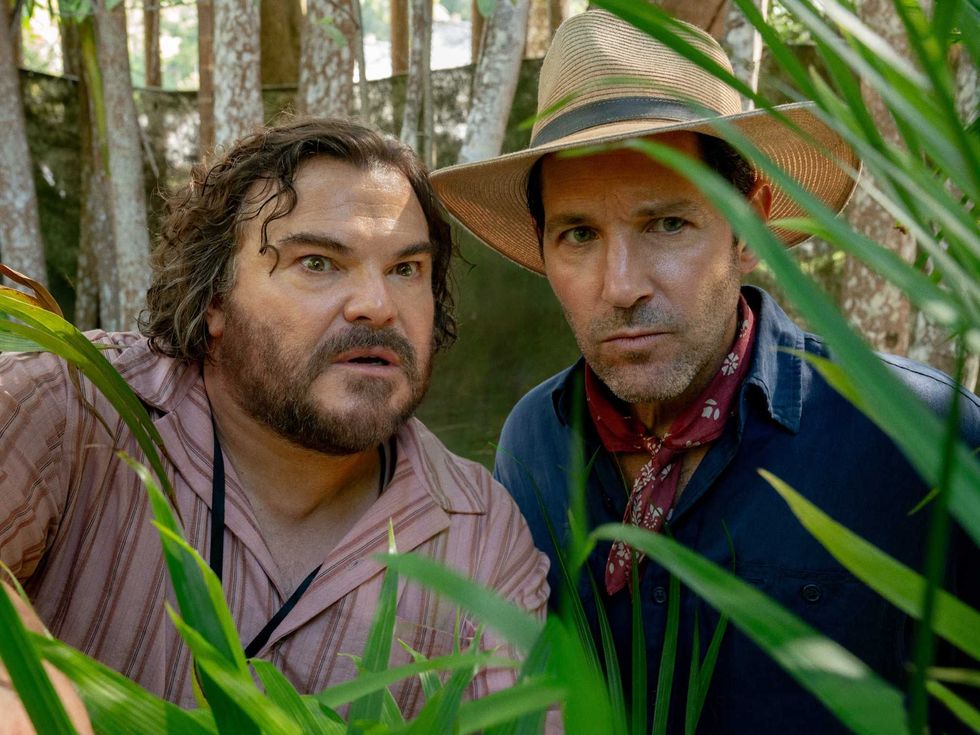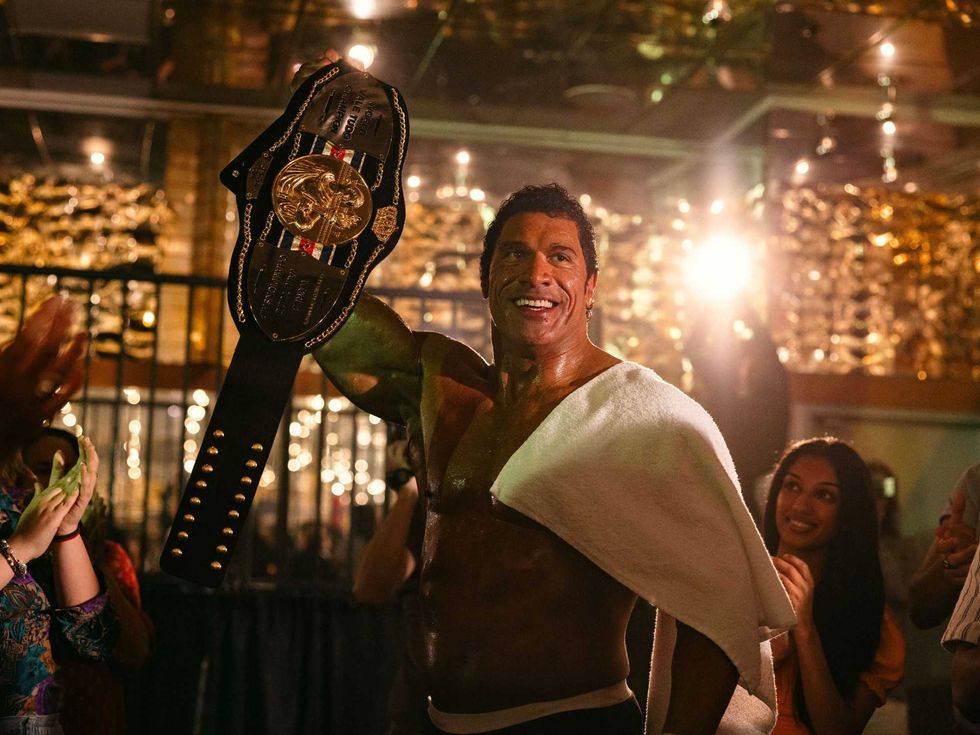Diary of an aspiring filmmaker
The big score: Finding the right music for our movie isn't as easy as we thought
 Concerts take on a whole new meaning when searching for music to put in a film(Cyril Neville with Tribe 13 at Discovery Green).
Concerts take on a whole new meaning when searching for music to put in a film(Cyril Neville with Tribe 13 at Discovery Green). Ford and Carlton film in 95-degree heat - and the camera only has so long beforeit needs a rest.
Ford and Carlton film in 95-degree heat - and the camera only has so long beforeit needs a rest. Scoring a film is one aspect of the filmmaking process that Ford and Carlton areleaving to the professionals.
Scoring a film is one aspect of the filmmaking process that Ford and Carlton areleaving to the professionals. Despite following a Beatles-themed car from conception to completion, del montefilms is not holding out much hope of including some of the group's music in thefilm.
Despite following a Beatles-themed car from conception to completion, del montefilms is not holding out much hope of including some of the group's music in thefilm. As everyone knows, good things happen over Goode Co. barbecue.Photo by Barbara Kuntz
As everyone knows, good things happen over Goode Co. barbecue.Photo by Barbara Kuntz
Editor's note: Ford Gunter quit his full-time journalism job in Houston to make a movie with his childhood buddy/co-director/business partner Carlton Ahrens. This is the third part of his account of chasing the dream with Art Car: The Movie.
Filmmakers are daydreamers. It’s part of what draws them to film. And when filmmakers daydream about their projects — and this happens a lot — it’s often about music. What rollicking stomp could go here, to support these shots, or what moving instrumental could go here, to support this sequence.
Carlton and I are both big music fans, but I got my start in journalism writing about it and I was used to dealing with the bands and the managers and the publicists. It is for this reason that I happily volunteered to head up the music portion of our film.
I lasted six months.
This is not to say that it can’t be done — it definitely can. We secured verbal and written agreements for the rights to a few of songs on our own, some for next to nothing and some for way too much. We shot for the stars on some requests and trolled the up-and-comers for others. Sometimes the reaction from each was exactly the opposite of what you’d expect. Reps handling multiplatinum millionaires wrote back in a day. Some bands that drive their own vans to 30-person gigs still haven’t responded.
As the summer drew to a close and the reality of this whole thing needing to be done in three months dawned, we called in a ringer.
***
One harsh reality of an ultra-low budget film is that it’s not going to look as good as you want. Just a fact. Advances in cameras, editing software, computers and lighting have all led to a marked improvement in image quality, but first-time filmmakers — especially first-time documentary filmmakers — rarely shoot in a completely controlled environment.
In a nutshell, you don’t control shit. Here’s our most recent revelation: if you’re filming around enough metal and close to enough truck traffic — say, at the Orange Show monument, for example, a block and a half from I-45 — a wireless microphone can and will drop audio when a particular CB radio wave hits it.
This was a new one for us, and there’s not much we could do except ask our subject to repeat the answer and try to pretend it was as off-the-cuff as the first time. Sometimes we had to ask a third time. Probably a fourth too, except we were filming in 95-degree heat and the camera only has so long before it needs a rest. And our subject’s perspiration may or may not need to be dabbed, because she can’t have a glistening forehead one shot and a dry one the next. Better yet, she shouldn’t have a glistening forehead at all, but there are some things you just can’t control.
See what I mean? Just one small example, and not one that can be saved by anything other than a reshoot or a cut. Sometime you live with what you got and move on. My point is, you need to beef up the stuff you can control — like music, hopefully — to help overcome some of these other weaknesses.
There are two types of music in film and both are expensive. The first is called a score and we’re not messing with that. The second is the individual song, and like I said, we had made some progress. Not a lot, but some.
The following I learned myself by trial and error and may be inaccurate in parts, even still. Pay attention. Here goes:
There are at least two things you need to obtain (read: purchase) for each song you want for your film. The first is called the synchronization license. This gives you the right to sync the music with moving pictures. It’s called the sync for short and usually comes from the artist that recorded the song. If the recording you want was written by someone else, like just about every Elvis Presley or George Strait song, for example, you have to get permission from both the author and the performer. The plot thickens.
The second is called the master use license. This is the actual recording, and it’s usually owned by the record company that paid for the recording sessions and the printing, the marketing and the distribution of the album. This is the same half of the Beatles catalog that Michael Jackson owns.
Record companies, just like movie studios, are getting creamed these days. They’re not inclined to flip a track from a rising indie band over to a couple of no-names for dirt-cheap because they are only spending a few thousand dollars on music. As many positive conversations we had with the artists, most ended with “call our manager.” This is the kiss of death, the hipster equivalent to “the check’s in the mail.” It’s when the relationship goes from a shared passion to a mildly interesting way to make $500.
In the band’s defense, it was always a one-sided relationship. We know their music; they don’t at all know our film. And we’re asking for something they’ve poured their hearts into for god-knows-how-long.
And in defense of the record companies, they have no incentive to cut us any deals just because we seem cool and the topic is interesting and our biggest bargaining chip is “we’ll definitely come back to these guys on the next project, when we have money to pay them what they deserve.” For one, there’s no guarantee that we’ll ever make another movie. For two, everybody is afraid of selling cheap to a tiny little film that suddenly explodes and makes tens of millions of dollars much to everyone’s surprise.
(Post your guesses for what movie is universally blamed for blowing the whole system in the comments section. Heads rolled for that one. Seriously, people lost their jobs and shit.)
Long story short, we called up Barry Coffing at MusicSupervisor.com. We’d met him at a Southwest Alternate Media Project conference over a year ago. Barry’s a Houston native who has been a music supervisor for years. His job is to put music in films, television shows, commercials — anything. Barry has the leverage to say, “We’ll come back to you,” because even if we never make another movie, Barry will work many, many more movies. And he’ll remember who cut him deals.
And for bands to get the attention of a guy like Barry, well that’s pretty big.
Like many in the business of music, film and the Internet, Barry is breaking new ground, building a massive online catalog of music that filmmakers can access with a simple password.
Barry is going to be the music supervisor on our film. In exchange for our money, he’s going to open up the vault to us, granting access to thousands of pieces of music from all over the world. And because Barry is a good guy and interested in our project (these things really do help sometimes), he’s going to go after our wish list and see about signing up some of those bands too. If not, he’s going to do his best to obtain the rights to their music for cheaper than we could have ever dreamed of, because he’s Barry and he’s got pull, and he can offer future considerations that ring more true than ours.
For now. One day we will be able to pay these artists what they deserve, and they will want to be involved in our projects because they kick ass. Naturally. In the meantime, we’re with Barry.
P.S. This was all decided over Goode Co. barbecue. Most good things are.
Other stories in the series:
Taking the terrifying leap into the movies: The safety net is gone & the time crunch is on
On the film road: Fighting the heat, money-reaching subjects & new realities











